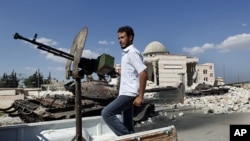Syrian activists say government and rebel forces continue to clash across the country, a day after the rebel Free Syrian Army announced it was moving its command center from Turkey to Syria.
The Syrian Observatory for Human Rights reports that most of the casualties from fighting Sunday occurred in the northern part of Syria. The Britain-based group also said the government was using aerial support to target rebel forces in central Homs province.
A day earlier, the Free Syrian Army - formed mostly of military defectors - released a video saying it is moving its command to what it called "liberated areas" of Syria. FSA chief, Colonel Riad al-Asaad, said the group hopes to launch an offensive on the capital, Damascus.
On Sunday, a group of 16 Syrian opposition parties met in Damascus and called for an end to what it described as Syria's "authoritarian regime." Ambassadors from Iran and Russia - two countries that support President Bashar al-Assad - also attended the meeting.
It is unclear how much sway this statement will have. President Assad's government strongly restricts criticism in the areas it controls, and the rebels fighting throughout Syria typically dismiss this so-called "internal" opposition grouping.
The Syrian conflict is expected to be a main topic of discussion when the 193 members of the United Nations gather this week for the organization's annual General Assembly session.
On Saturday, U.N. Secretary-General Ban Ki-moon and the international envoy for Syria, Lakhdar Brahimi, discussed how to address what they called the "appalling levels of violence" in Syria and how to progress towards an inclusive political solution. They also said they hoped the U.N. session will increase support for addressing the grave humanitarian situation in Syria and its impact on neighboring countries.
The Syrian Observatory for Human Rights reports that most of the casualties from fighting Sunday occurred in the northern part of Syria. The Britain-based group also said the government was using aerial support to target rebel forces in central Homs province.
A day earlier, the Free Syrian Army - formed mostly of military defectors - released a video saying it is moving its command to what it called "liberated areas" of Syria. FSA chief, Colonel Riad al-Asaad, said the group hopes to launch an offensive on the capital, Damascus.
On Sunday, a group of 16 Syrian opposition parties met in Damascus and called for an end to what it described as Syria's "authoritarian regime." Ambassadors from Iran and Russia - two countries that support President Bashar al-Assad - also attended the meeting.
It is unclear how much sway this statement will have. President Assad's government strongly restricts criticism in the areas it controls, and the rebels fighting throughout Syria typically dismiss this so-called "internal" opposition grouping.
The Syrian conflict is expected to be a main topic of discussion when the 193 members of the United Nations gather this week for the organization's annual General Assembly session.
On Saturday, U.N. Secretary-General Ban Ki-moon and the international envoy for Syria, Lakhdar Brahimi, discussed how to address what they called the "appalling levels of violence" in Syria and how to progress towards an inclusive political solution. They also said they hoped the U.N. session will increase support for addressing the grave humanitarian situation in Syria and its impact on neighboring countries.
Some information for this report was provided by AP and AFP.





